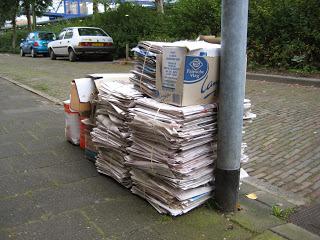 A lot of businesses seem to underestimate the quality of recycled paper. Some people believe that recycled content paper is thin or flimsy and that it does not hold ink well. The truth is that recycled paper performs just as well as virgin fiber paper; actually, it’s even better. When comparing the quality of different stocks, recycled paper is about the same. However, recycled paper has some distinct business advantages that virgin paper cannot replicate.
A lot of businesses seem to underestimate the quality of recycled paper. Some people believe that recycled content paper is thin or flimsy and that it does not hold ink well. The truth is that recycled paper performs just as well as virgin fiber paper; actually, it’s even better. When comparing the quality of different stocks, recycled paper is about the same. However, recycled paper has some distinct business advantages that virgin paper cannot replicate.Thickness
When you are choosing a paper stock, you usually do not want flimsy paper. While somewhat thin paper can be used for archival purposes, you want to use a nice, thick stock when making memos or sending out letters to customers. While many people consider recycled paper to be very thin, recycled paper stock actually comes in the same varieties and thickness as any other paper.
Archival paper normally starts around 20 lb. thickness, and letterhead is around 24 to 28 lb. Recycled paper comes in all of these thicknesses, so it can easily satisfy most needs.
Ink and Toner Absorption
Another big misconception with recycled paper stock is that it cannot absorb ink or toner very well. This logically seems to have some basis. Since recycled paper is made by washing and reusing recovered waste paper, the fibers shouldn’t have the same absorbency. But the reality is that this paper absorbs ink and toner just as easily as virgin fiber paper. This means that print quality does not suffer.
Recycled Stock Usage
Recycled papers have many of the same uses as virgin fiber paper. You can get multipurpose paper that is good for general printing, like for reports or internal memos, or specialized paper like 3-hole or letterhead paper. Recycled paper can be used for nearly everything that virgin paper is used for.
Environmental Benefits
One big advantage that recycled paper stock has over normal paper is that it saves trees. Instead of cutting down more trees to make more paper, recovered waste paper is used to make the sheets. On average, one ton of paper uses about 20 less trees than virgin fiber paper. Considering the amount of paper used by the average business office on a daily basis, this adds up to having a significant impact on the conservation of forest resources.
Not only that, but less energy and other resources are needed to make recycled paper, so the savings are everywhere.
Business Benefits
Much like the environmental benefits, virgin paper cannot emulate the business benefits of using recycled stock. Green technology and supplies have the ability to enhance your company’s public image because people tend to have a higher respect for companies that care about the environment.
By showing customers that you care by using environmental paper, you can increase your number of clients. Using other green resources can help improve this, but using a recycled paper is a good place to start.
Conclusion
While there is some deceptive misinformation circulating about recycled paper, the truth is that recycled stock is just as good as virgin paper when it comes to everyday use. However, there are also environmental and business benefits to using recycled paper which can really help your business to succeed.
